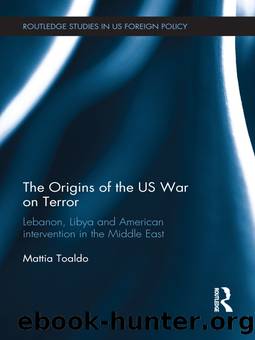The Origins of the Us War on Terror: Lebanon, Libya and American Intervention in the Middle East by Mattia Toaldo

Author:Mattia Toaldo [Toaldo, Mattia]
Language: eng
Format: epub
Tags: Political Science, General
ISBN: 9780415685016
Google: c_gePvKuC_YC
Goodreads: 13715750
Publisher: Routledge
Published: 2012-10-29T00:00:00+00:00
Enters Benjamin Netanyahu
As a matter of fact, these concepts had been stressed even more seriously during the conference on international terrorism held in June 1984 at the Jonathan Institute in Washington. Though farther away from the spotlight, this conference laid the ground for Shultzâs successive speech at the Park Avenue Synagogue and the study of its proceedings demonstrates the degree of osmosis between the thinking of Israeli right-wingers and that of some members of Reaganâs White House.
Shultzâs campaign in 1984 attempted to bring about a dramatic change in what he perceived as the threat of the future: terrorism against Western democracies carried out by organizations supported by a network of states eventually linked with the Soviet Union. His âdoctrineâ called for the use of the military to conduct pre-emptive strikes against sponsor states. Two elements had a decisive influence on him: first, as mentioned above, the withdrawal from Lebanon and the lessons that he, along with others, had learned from it; second, the intellectual cooperation between American conservative policy-makers and Israeli right-wing politicians such as Benjamin Netanyahu and Moshe Arens.
Netanyahu at that time was an Israeli diplomat at the UN and a commentator for CNN. The man who later became prime minister of Israel was also head of the Jonathan Institute, named after his brother who had died in the raid in Entebbe (Uganda) to free Israeli citizens who had been kidnapped by Palestinian terrorists. Jonathan, according to Benjamin, had died in âthe war against terrorâ and he âbelieved that the battle against terrorism was part of a much larger struggle, one between the forces of civilization and the forces of barbarismâ.58
The Institute had organized its first international conference in Jerusalem in 1979. Representing the US was the cold warrior Democratic Senator Henry âScoopâ Jackson. In Jerusalem some concepts that later became popular in the 1980s (and beyond) were discussed for the first time. First of all was the issue of state sponsorship. As the background paper for the successive meeting recollected,
Among the sponsors of terrorism discussed in the Conference were the newly transformed Iran, as well as Libya, Iraq, Syria, South Yemen and other Arab countries (â¦). The Soviet Union, it was noted, used terrorism as an effective tool with which to destabilize and demoralize the West.59
The following conference was organized, incidentally, in Washington, DC in June 1984. Several US conservative and neoconservative policy-makers and intellectuals attended along with members of the Israeli Likud party. The proceedings were to be published in the summer of 1986 in a book edited by Netanyahu and titled, not by chance, Terrorism: How the West Can Win.60 Reagan read the book when it came out and was enthusiastic about it as it is evident from a letter written by Shultz to Netanyahu.61
In his review for the New York Review, Shaul Bakbash highlighted the cornerstones of Netanyahuâs thought about terrorism: first, the primary target of terrorists are Western democracies; second, all the terrorists are linked in an international network; third, the network survives because
Download
This site does not store any files on its server. We only index and link to content provided by other sites. Please contact the content providers to delete copyright contents if any and email us, we'll remove relevant links or contents immediately.
The Secret History by Donna Tartt(19058)
The Social Justice Warrior Handbook by Lisa De Pasquale(12187)
Thirteen Reasons Why by Jay Asher(8894)
This Is How You Lose Her by Junot Diaz(6877)
Weapons of Math Destruction by Cathy O'Neil(6267)
Zero to One by Peter Thiel(5789)
Beartown by Fredrik Backman(5737)
The Myth of the Strong Leader by Archie Brown(5500)
The Fire Next Time by James Baldwin(5432)
How Democracies Die by Steven Levitsky & Daniel Ziblatt(5216)
Promise Me, Dad by Joe Biden(5144)
Stone's Rules by Roger Stone(5081)
A Higher Loyalty: Truth, Lies, and Leadership by James Comey(4954)
100 Deadly Skills by Clint Emerson(4921)
Rise and Kill First by Ronen Bergman(4780)
Secrecy World by Jake Bernstein(4742)
The David Icke Guide to the Global Conspiracy (and how to end it) by David Icke(4709)
The Farm by Tom Rob Smith(4502)
The Doomsday Machine by Daniel Ellsberg(4485)
